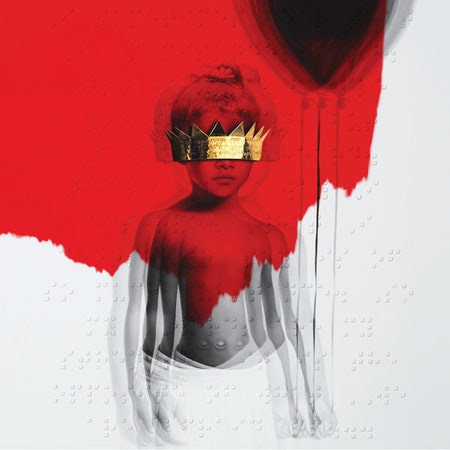Part of Rihanna’s appeal is aspirational: survey the photographic evidence, and she seems to spend a pretty good chunk of her time wearing jewelry on yachts, smoking terrifically robust marijuana cigarettes, and making goofball faces at jokers trying to stealth-snap pics of her as she parties deep into the night.
Yet somehow, those hijinks don’t lessen her seriousness; they merely amplify it. Rihanna’s sureness regarding her presence in the world—in the work that she’s made, in the ways in which she has earned the right to palm a cocktail and chill on a beach—is bold and motivating, like Actual Confidence always is. Hearing her deliver a line like "Don’t act like you forgot/ I call the shot-shot-shots" (from 2015’s "Bitch Better Have My Money") with a kind of preternatural calm—it’s hard to imagine anything ever feeling better than that. It is hard to imagine anyone inhabiting a pop career with more ease or aplomb.
Still, ANTI—her very-long-awaited eighth LP—arrived tentatively, almost meekly. The build-up, of course, was extraordinary. There’d been rascally fake-outs, three singles (none of which made it onto the actual album), whole social media accounts teasing its release. Then, last Wednesday afternoon, a track listing appeared (that a gang of disembodied song titles still constitutes a noteworthy breach surely indicates something about our desperate times), followed by the announcement that ANTI would be streaming exclusively on Tidal for its first week of release (who cares)—two meager dribbles of intel that were quickly overshadowed, perhaps rightly, by Kanye West hollering about pants.
Then, suddenly, the album appeared in full. Anyone hoping its delayed release might suggest something about its ambition, that the three-years-in-the-making ANTI might be Rihanna’s opus, a grand declaration of intent, is likely to be underwhelmed. ANTI is a rich and conflicted pop record, at its most interesting when it’s at its most idiosyncratic. It’s not crammed with bloodthirsty, dance-oriented jams and feels distinctly smaller, more inward-facing than her previous records, as if it were intended as a kind of spiritual stock-taking, a moment of reckoning for both Rihanna and her fans. Her grainy, mesmerizing voice is paramount here, the sun in ANTI’s universe, the thing everything else orbits: "I got to do things my own way, darling," she announces over a stuttering, distorted beat in opener "Consideration," a prickly collaboration with the R&B singer SZA. The sentiment feels deliberately placed, meant as a way to read everything that follows.
Ironically, if the album has a narrative arc buried underneath the fuck-off, broad-strokes empowerment now so omnipresent on pop radio, it’s about disappointment: The ways in which the people you trust can still come up short in the end, and how catastrophically lonesome that can feel. It’s also about self-isolation, and how being good at being on your own ("I can be a lone wolf," she sings on "Desperado," her vocals deep, crackly) can become its own kind of albatross, a cage that bars from the inside.
